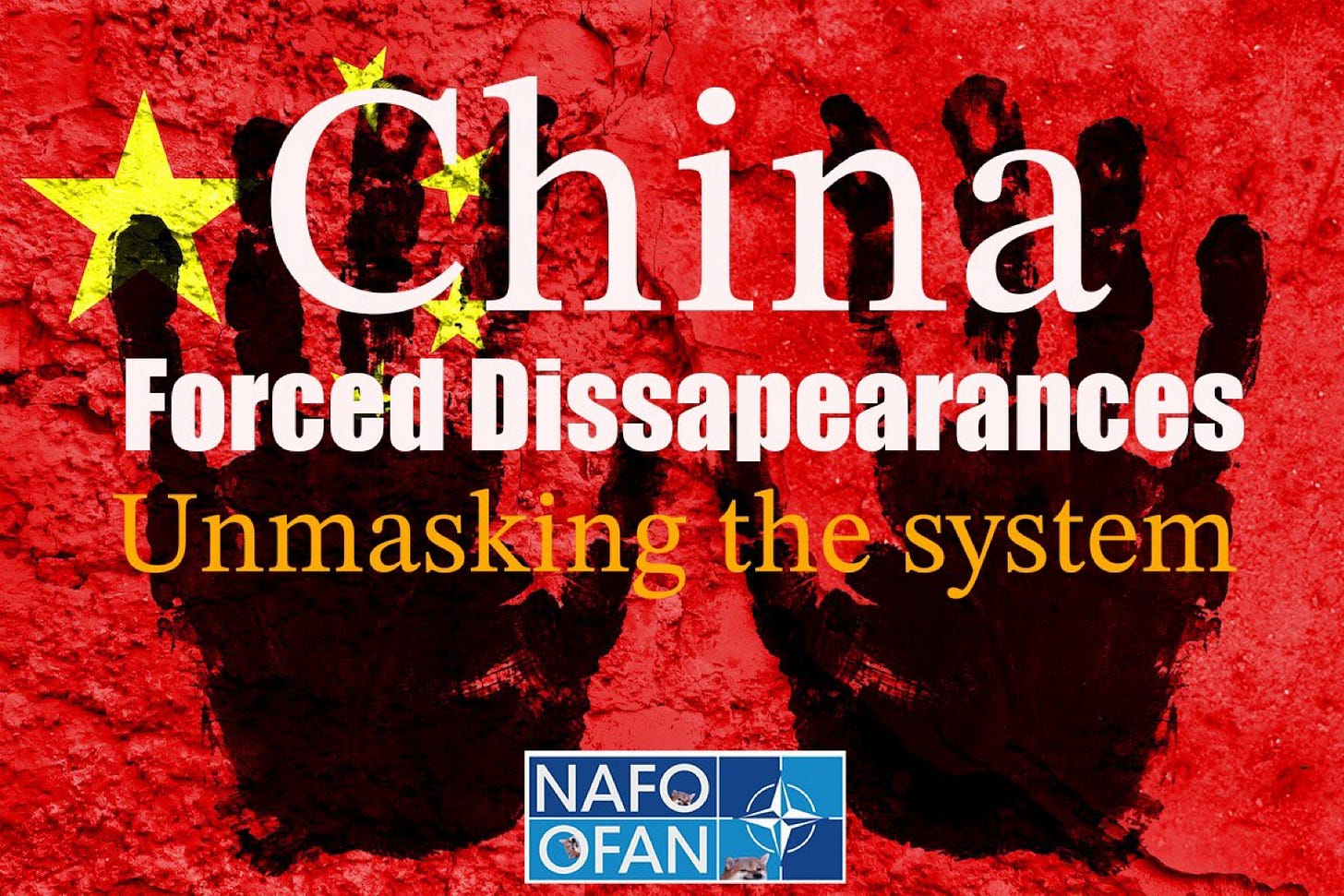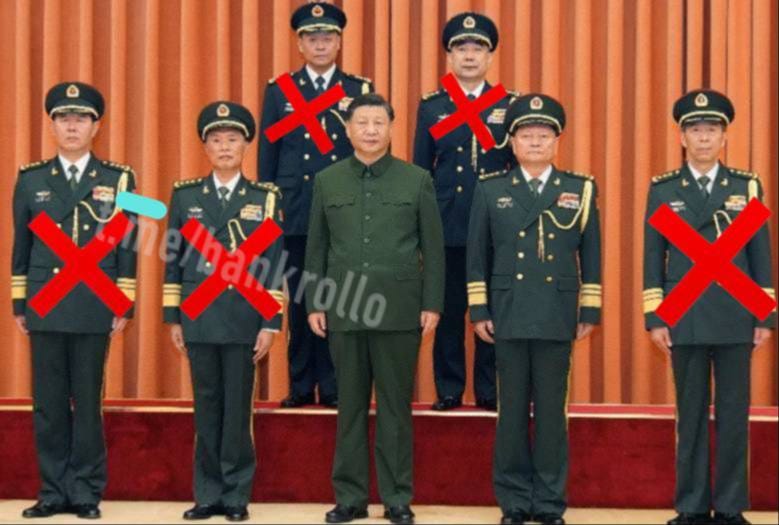Xi Jinping’s two types of disappearances
Unmasking the Chinese dictator’s system of forced disappearances and murder.
Uncovering the Chinese dictators scheme of disappearances of dissenters and opponents. I published this thread on Twitter in 2023 - casting light on forced disappearances.
Fast forward to July 2025 - Xi Jinping has "cleaned out" almost all the central generals in China's Defense Ministry. Of the six people in the photo taken in 2023, only one has retained his position
As President #Biden meets with #dictator #XiJinping, a thread to share information about the type of murderous regime he is dealing with - and the crimes against humanity being perpetrated by #Jinping and his corrupt Chinese Communist Party (#CCP)regime.
History of #disappearances; a few examples highlighted.
In 1971, Lin Biao, hailed by #China as Mao Zedong’s successor, fell from grace, fled the country and was killed in an air-crash in Mongolia. Despite his prominence, it was weeks before the public was told of his death, and months before any explanation was offered. The recent spate of disappearances from China’s top echelons is hardly as seismic.
They have happened in calmer #political waters, far from the Cultural Revolution’s turmoil. But they speak to the way that politics still operates in Beijing. The glaring absences of senior officials are eventually followed by a belated narrative of their downfall in the rumour mill and then state media.
When Qin Gang, the foreign minister, vanished from public view in June, it was particularly conspicuous given his diplomatic role. It was almost a month before authorities confirmed that he had been removed from his post. A few weeks later, China’s defence minister, Li Shangfu, also failed to appear at scheduled meetings with foreign officials.
Reuters has reported that he is being investigated over corruption in military procurement. The two most senior generals overseeing nuclear and conventional land-based missiles had already been replaced at the beginning of August. One was reportedly taken away by corruption investigators.
When the Chinese authorities arrested or detained more than 280 lawyers and activists in July 2015, the move was viewed as an explicit crackdown on human rights. Not only were detainees prevented from practicing law – and therefore prevented from pursuing human rights cases through legal channels – they were held in conditions that are tantamount to enforced disappearance.
Regularising the conditions of detention for some, in January this year the Chinese authorities raised formal charges against seven lawyers who had been held in secret detention. Consistent with a systematic effort to maintain legality while restricting the scope for human rights advocacy by members of the legal profession, the authorities recently amended the Lawyers Law, the Criminal Law, and the National Security Law, extending the scope for official intervention.
Many of the lawyers who have been arrested have been placed under “designated residential surveillance”, a kind of secret detention formalised by the Criminal Procedure Law. This authorises incommunicado – often solitary – confinement for up to six months.
While prisoners are held under these conditions, families and legal counsel have no information about their whereabouts. Since the authorities have legitimised secret detention, the risk of abuse during incarceration is likely to have increased.
The secret detention of prominent human rights lawyer Wang Yu, who was held incommunicado for six months together with her husband and child before being formally charged in January, has come to symbolise the plight of hundreds of lawyers. No information about the whereabouts of other detained human rights lawyers, including Li Heping, Li Chunfu and Wang Quanzhang, is currently available.
Next 👉 The SYSTEM of Disappearances
The chinese regimes system of “disappearances” in China under the dictator Xi Jinping - as reported by SafeGuardDefenders
Unbeknown to most, since Xi Jinping assumed power, China started implementing two regulated and “legalized” systems for secret detention and enforced disappearances: 1) RSDL, aimed at rights defenders, civil society, and “regular criminals”; and 2) Liuzhi, aimed at Chinese Communist Party members, State functionaries, but also against those working within academia, State-Owned Enterprises, State-media, local contractors, or anyone related to any of the above.
#RSDL - Residential Surveillance at a Designated Location - came into effect in 2013, while Liuzhi – “retention in custody” – has been adopted in 2018. While both systems have predecessors, their current functioning is very much a product of Xi Jinping’s China.
They are but two of many developments that have severely undermined regulated detention and criminal justice procedure since 2013, and represent key loopholes against legal safeguards otherwise available for those targeted with detention, arrest and prosecution.
Following submissions by Safeguard Defenders and partner NGO’s, United Nations Independent Experts have repeatedly condemned the use of RSDL and Liuzhi as tantamount to enforced disappearances and torture.
Already in 2015, the UN Committee Against Torture expressly called on the Chinese authorities to repeal the system of RSDL as a matter of urgency. China has since failed to submit its periodic report to the Committee, due in December 2019.
SafeGuard Defenders reported that data shows, the use of disappearances and arbitrary detention in China is significantly growing and is neutering almost all sectors of potential dissent from the government’s hard-line, both within civil society and the government, academia and the Party.
Data on the scope of RSDL is drawn from China’s Judgment Online, a database on verdicts run by the Supreme Court, while data estimates on Liuzhi comes from public statements by the CCDI (the Party-organ that runs Liuzhi) as well as their work reports to the National People’s Congress and Party/State media reports.
For anyone working in government-related environments in China, the sheer mention of Liuzhi is bound to send shivers down their spine. The same goes for any lawyer, journalist or civil society worker at the mention of RSDL. The horrors inside the Liuzhi system have been exposed in the extensive Human Rights Watch report Special Measures, back when the system was used exclusively on Party members and called “Shuanggui”.
The functioning of the re-edition’ed Liuzhi system has been analysed in Safeguard Defenders’ brief From Central Control to National Supervision and in exhaustive submissions to the UN.
Next 👉 Widespread and systematic practice
A widespread and systematic practice
With both systems operating simultaneously since 2018, modest estimates indicate that at the very least 104,492 people have disappeared into the systems (47,291 into RSDL; 57,201 into Liuzhi). These include a number of high profile targets such as actress Fan Bingbing, Supreme Court judge Wang Linqing, former Chairman of Interpol Meng Hongwei (and probably mogul Jack Ma), as well as numerous foreign citizens, including Canadian diplomat Michael Kovrig.
If we add data on RSDL use between 2013 and 2017, the number rises to 141,167. At the basis of these estimates, one dataset is of particular interest: the minimum number of acknowledged cases. These are numbers provided directly by the Chinese government (or Party) and cannot therefore not be disputed by the government (or Party).
For RSDL - drawing from the Supreme Court website on verdicts for criminal trials at first trial – up to February 18, 2022, that number is 23,700 (verdicts, nor persons) for 2013 to 2021; or 13,105 for 2018 to 2021 only.
For Liuzhi, despite the extremely limited amount of public data available (published numbers exist only for 8/33, 3/33, and 3/33 provinces or regions for 2018 to 2020 respectively, plus CCDI data of 5,006 Liuzhi placements for investigation into the sole accusation of “bribery” for 2021), that number is 11,391.
These numbers place the combined acknowledged use of RSDL and Liuzhi at 35,091 since 2013.
However, occasionally some additional data are released, such as the CCDI’s number of Liuzhi placements as part of a specific campaign targeting law enforcement officials (全国政法队伍教育整顿) citing 1,760 cases of Liuzhi between March and June 2021, and 2,875 between February 27 and end of July 2021. If these two data points are extrapolated to the full year, indicates 5,280 to 6,900 people were placed into Liuzhi in 2021 as part of this campaign alone.
While some cases in this dataset might overlap with the provincial or “bribery” campaign data, there is no way to account for them in the officially acknowledged numbers, but it does provide a clear indication that the estimated number for 2021 is far too low, and that likely there has been a continued growth compared to 2020.
Safeguard Defenders has consistently used and extrapolated the little publicly available data provided by Chinese authorities to provide a more likely conservative estimate on the scope of use of the systems: The full methodology for the RSDL data can be found in Rampant Repression, while the methodology for the estimates on Liuzhi can be found in our latest evidence submission here.
Fog of war and crimes against humanity
Safeguard Defenders presents these data and estimates both for the purpose of informing UN Experts and governments on their continued and expanding use, and because the “fog of war” is increasing. Year by year, the CCDI has released less useful data on its use of Liuzhi, and if this trend continues it will be harder to make realistic estimates in the future.
More worrying - and another trend that is damaging China’s criminal justice system in and of itself - is the systematic removal of information from the China Judgments Online database. One ChinaFile investigation estimated that some 11 million verdict were actively removed during three months in early 2021.
The “fog of war” is set to increase on both these issues, and the latest data provided to UN Experts might be the best and most realistic data we can expect to get.
In any case, the data shows beyond any doubt that the use of RSDL and Liuzhi are both widespread and systematic, thus constituting a crime against humanity under the Rome Statute of the International Criminal Court for they are enforced disappearances and acts of torture according to international law.
Furthermore, Liuzhi also constitutes arbitrary detentions carried out entirely by an organ of a political party rather than a law enforcement agency.
Next 👉 Keypoints
KEY POINTS ON CHINESE DISAPPEARANCES:
❌ The combined use of RSDL and Liuzhi is estimated to have used on some 104,492 people between 2018 and 2021
❌ The use of RSDL and Liuzhi likely reach 31,520 cases in 2020
❌ The use of RSDL increased significantly 2020, despite Covid restrictions, and continues to be used at higher than before levels during 2021 too
❌ Liuzhi is quickly rivalling and overtaking RSDL in scope of use
❌ Verdicts mentioning RSDL are disappearing from the Supreme Court database, and 6.5% of all RSDL mentions in verdicts disappeared for 2013 to 2019 in search results between February 2021 and February 2022
References and Sources:
https://safeguarddefenders.com/en/blog/china-s-pincer-move-against-regulated-detentions
https://en.m.wikipedia.org/wiki/Category:Missing_person_cases_in_China
https://www.icmp.int/news/enforced-disappearances-in-china/
If you enjoy my threads, please consider supporting my work on Patreon or BuymeACoffee!
Thank You! to those who have supported me on Patreon or buymeacoffee, Thank You for keeping me going!.
buymeacoffee.com/beefeaterfella
patreon.com/Beefeater_Fella
beefeaterresearch.substack.com
BeefeaterFella youtube.com/@beefeaterfella













None of this should be of any great surprise. Xi, like all self respecting dictators would never tolerate dissent or opposition. Stalin famously said (I'm paraphrasing here) "Death solves all problems. No man no problem"